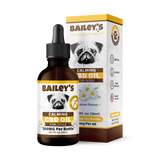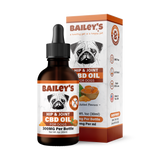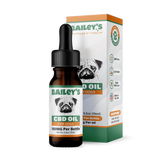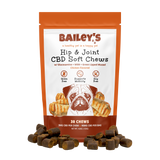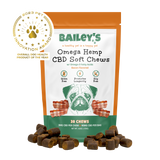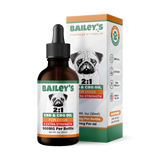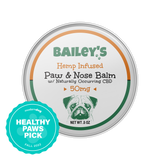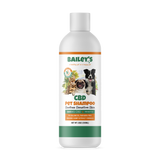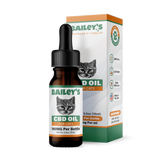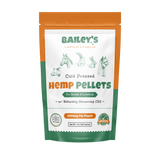Beef Jerky and Cats: Feline Feeding Advice

Feeding our feline friends the right diet is crucial for their overall health and well-being. As pet owners, it's important to understand their dietary needs and make informed choices when it comes to feeding them.
Together with the helpful folks at Bailey’s CBD , we will discuss beef jerky and its appeal to cats, as well as safe alternatives and how to transition your cat to a healthier diet. We will also emphasize the importance of consulting with a veterinarian for expert advice on feline nutrition.

Table of Contents
1. Understanding Feline Dietary Needs
Before diving into the specifics of beef jerky and cats, it's important to understand the carnivorous nature of these amazing creatures. Cats are obligate carnivores, which means they require a diet primarily consisting of meat to thrive. Their bodies are designed to digest and absorb nutrients from animal protein efficiently.
1.1 The Carnivorous Nature of Cats
Cats have evolved as natural hunters, relying on meat for sustenance. Their digestive system is shorter compared to herbivores or omnivores, making it easier for them to process animal protein. It provides them with the essential amino acids, vitamins, and minerals necessary for their growth and maintenance.
Due to their carnivorous nature, cats have unique dietary requirements that differ from other animals. Unlike humans and some other animals, cats lack the necessary enzymes to break down plant-based proteins efficiently. Therefore, they rely heavily on animal protein as their primary source of nutrition.
Furthermore, cats have a higher protein requirement compared to many other animals. This is because they have a higher metabolic rate and a greater need for amino acids, which are the building blocks of protein. Amino acids play a crucial role in various bodily functions, including muscle development, tissue repair, and hormone production.
🐾 Related Article 🐾
Bacon and Cats: Feline Diet Alert - What Cat Owners Should Know!1.2 Essential Nutrients for Cats
When it comes to feline nutrition, certain nutrients are vital for their well-being. These include high-quality animal protein, such as chicken or fish, which provides essential amino acids like taurine. Taurine is crucial for their heart health and vision.
In addition to protein, cats require a moderate amount of fats for energy and to support healthy skin and coat. Fats are a concentrated source of calories and provide essential fatty acids, like omega-3 and omega-6, which contribute to their immune system and reduce inflammation.
Vitamins, such as Vitamin A, D, E, and B-complex, are necessary for various bodily functions and overall health. Cats also require minerals like calcium, phosphorus, and potassium for strong bones and teeth.
It's important to note that cats have specific dietary needs that differ from dogs and humans. For example, cats require higher levels of certain vitamins, such as Vitamin A, due to their inability to convert plant-based sources of Vitamin A into the active form that their bodies can utilize. Therefore, it's crucial to provide cats with a balanced and species-appropriate diet to ensure their optimal health and well-being.
When choosing commercial cat food, it's essential to read the labels carefully and select products that meet the nutritional requirements of cats. Look for high-quality ingredients, including named animal protein sources, and avoid products that contain fillers, artificial additives, or excessive amounts of carbohydrates.
Additionally, it's worth considering the age, activity level, and specific health needs of your cat when determining their dietary requirements. Kittens, for example, have different nutritional needs compared to adult cats, and senior cats may benefit from diets that support joint health and cognitive function.
By understanding the carnivorous nature of cats and their specific dietary needs, you can ensure that your feline companion receives the nutrition they require to lead a healthy and fulfilling life. As always, consulting your cat’s favorite veterinarian about their diet and supplementary needs is wise and responsible.
Featured Product for Feline Wellness🐱:
Bailey's CBD Oil for Cats: Optimal Health and ComfortSpecial Offer: Use code TRYBAILEYS25 for 25% off your first order!
2. The Appeal of Beef Jerky to Cats
Beef jerky is a dehydrated meat snack that humans enjoy, but what is it about beef jerky that appeals to cats?
2.1 Why Cats Are Attracted to Beef Jerky
The strong aroma of beef jerky is irresistible to our feline friends. It's no secret that cats have a keen sense of smell, and the smell of meat can be highly enticing for them. The chewy texture and savory flavors also make beef jerky a desirable treat for many cats.
When a cat catches a whiff of beef jerky, their olfactory receptors go into overdrive. These receptors are highly sensitive and can detect even the faintest scents. The aroma of beef jerky triggers a primal instinct in cats, reminding them of their natural hunting instincts. It's as if they can taste the juicy meat with every sniff.
Furthermore, the texture of beef jerky adds to its appeal. Cats love to chew on things, and the tough, chewy nature of jerky satisfies their natural urge to gnaw. The act of tearing into the jerky mimics the sensation of tearing through prey, providing a satisfying and fulfilling experience for our feline companions.
2.2 Potential Risks of Feeding Beef Jerky to Cats
While beef jerky can be tempting to share with your cat, it's important to be aware of the potential risks associated with feeding it to them. Many commercial beef jerky products intended for human consumption contain seasonings, spices, or preservatives that could be harmful to cats.
Certain seasonings and spices, such as onion and garlic, can be toxic to cats. These ingredients can cause damage to a cat's red blood cells, leading to anemia and other serious health issues. Preservatives like sodium nitrate, commonly found in beef jerky, can also be harmful to cats when consumed in large quantities.
Additionally, beef jerky can be high in sodium, which is not ideal for cats. Excessive sodium intake can lead to issues such as dehydration and kidney problems. Cats have a low thirst drive, and their kidneys are not as efficient at processing sodium as humans. Therefore, feeding them salty treats like beef jerky can put unnecessary strain on their kidneys and overall health.
Moreover, the high protein content in beef jerky may also cause digestive upset or pancreatitis in some cats. Cats have specific dietary needs, and their bodies are not designed to handle large amounts of protein in one sitting. Feeding them too much beef jerky can lead to gastrointestinal issues, including vomiting and diarrhea.
It's always best to consult with your veterinarian before introducing any new food into your cat's diet, including beef jerky. They can guide safe and appropriate treats for your feline companion, ensuring their health and well-being are always prioritized.
Related Cat Nutrition Article🐱:
Shrimp and Cats: Is Seafood Safe for Your Feline?3. Safe Alternatives to Beef Jerky for Cats
If you're looking for safe and healthy alternatives to beef jerky, there are several options to consider.
Cats are obligate carnivores, which means they require a diet high in animal protein to thrive. While beef jerky may seem like a tempting treat for your feline friend, it's important to note that not all beef jerky is safe for cats. Many commercially available beef jerky products contain high levels of sodium, artificial additives, and preservatives that can be harmful to cats.
Fortunately, there are alternative options that can provide your cat with a tasty and nutritious treat without compromising their health.
3.1 Commercially Available Cat Treats
There are numerous commercially available cat treats specifically formulated with feline nutritional needs in mind. These treats are often made from high-quality ingredients, and some even contain added nutrients to support specific health concerns.
When choosing commercial cat treats, look for those that are low in sodium and free from artificial additives or preservatives. Opt for treats that are made from real meat, such as chicken or fish, as these provide a natural source of protein that cats need.
Additionally, consider treats that have added benefits, such as dental health support or hairball control. These can help address common issues that cats may face while providing them with a delicious snack.
Related Cat Nutrition Article🐱:
Ham and Cats: Understanding the Nutritional Impact3.2 Homemade Treat Options for Cats
If you prefer a DIY approach, you can make excellent cat treats at home using cat-safe ingredients. This allows you to have full control over the quality of the treats and ensures that they are tailored to your cat's specific dietary needs.
Some examples of homemade cat treats include small pieces of cooked chicken or fish. These can be easily prepared by baking or boiling the meat and then cutting it into bite-sized pieces. Cats often find these treats irresistible, and they provide a healthy source of protein.
Another option is to make catnip-infused treats. Catnip is a herb that many cats find highly enjoyable. By incorporating it into homemade treats, you can provide your cat with a unique and stimulating experience. Just be sure to use catnip that is specifically labeled as safe for feline consumption.
Freeze-dried meat treats are also a popular choice among cat owners. These treats are made by removing moisture from the meat, which intensifies the flavor and creates a crunchy texture that cats love. Freeze-dried treats are convenient and can be easily stored for longer periods without the need for preservatives.
Always consult with your veterinarian before introducing new homemade treats to ensure they are safe and appropriate for your cat. Your vet can guide portion sizes and help you choose ingredients that align with your cat's dietary needs and any specific health concerns they may have.
Remember, treats should only make up a small portion of your cat's overall diet. It's important to prioritize balanced and nutritionally complete cat food as the main source of their nutrition.
Related Cat Nutrition Article🐱:
Raw Chicken for Cats: Safety and Dietary Advice
4. How to Transition Your Cat to a Healthier Diet
Transitioning your cat to a healthier diet requires patience and careful planning. It's important to make gradual changes to avoid upsetting their digestive system.
4.1 Gradual Changes in Cat's Diet
Start by mixing a small amount of the new food with your cat's current diet. Gradually increase the proportion of the new food over several weeks, monitoring your cat's response to the change. This gradual transition helps prevent gastrointestinal issues and allows your cat to adjust to the new flavors and textures.
4.2 Monitoring Your Cat's Health During Dietary Changes
While transitioning your cat's diet, it's essential to monitor their health and well-being. Keep an eye on their appetite, energy levels, stool consistency, and overall demeanor. If you notice any drastic changes or concerns, consult your veterinarian for guidance.
Related Cat Health Article🐱:
5 Benefits of CBD Oil for Cats: Health & Wellbeing5. Consulting with a Veterinarian for Feline Dietary Advice
When it comes to making the best dietary choices for your cat, consulting with a veterinarian is invaluable.
5.1 When to Seek Professional Advice
If you have any concerns about your cat's current diet or want guidance on how to provide them with the best nutrition, schedule an appointment with your veterinarian. They can assess your cat's specific needs, provide tailored dietary recommendations, and address any questions or concerns you may have.
5.2 Regular Check-ups for Dietary Assessment
Regular veterinary check-ups are essential for monitoring your cat's overall health and assessing their dietary needs. Your veterinarian can track their weight, evaluate their body condition, and make adjustments to their diet if necessary.
Related Cat Behavior Article🐱:
Why Does My Cat Bite Me? Understanding Feline Behavior6. Conclusion
Feeding your cat a nutritious and balanced diet is essential for their optimal health and longevity. While beef jerky may be tempting to share with your feline friend, it's important to consider the potential risks and opt for safer alternatives. Consult with your veterinarian for expert advice on feline nutrition and to ensure that your cat receives the best possible care.Featured Product for Feline Wellness🐱:
 Bailey's CBD Oil for Cats: Pure, Safe, & Effective
Bailey's CBD Oil for Cats: Pure, Safe, & Effective Special Offer: Use code TRYBAILEYS25 for 25% off your first order!

